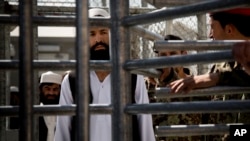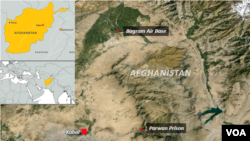ISLAMABAD —
Afghanistan has released a group what U.S. forces have described as “dangerous” prisoners from a maximum security prison. That move is likely to further erode relations between the two countries.
U.S. forces describe the 65 detainees released from Bagram prison as “dangerous individuals” who have killed Afghan men, women and children, as well as coalition soldiers.
In a strongly worded statement, U.S. Forces - Afghanistan said both American and Afghan forces had risked their lives to ensure the safety of the Afghan people, and called upon the government to consider the potentially lethal effects of the releases.
Speaking while on a visit to Turkey, Afghan President Hamid Karzai defended the move. He said the prisoners’ cases had been investigated and the decision made to free them.
“Afghanistan is a sovereign country. If the Afghan judicial authorities decide to release a prisoner it is of no concern to the U.S. and should be of no concern to the U.S.," said Karzai. "And I hope that the U.S. will stop harassing Afghanistan’s procedures and judicial authority and I hope that the United States will now begin to respect Afghan sovereignty.”
The U.S. Forces statement said hard evidence or investigative leads on the prisoners were provided to the Attorney General’s office.
It added that individuals previously released had already returned to fighting.
Afghanistan took control of Bagram prison from U.S. troops last year, as international forces began their transition out of the country. The prison has been renamed Parwan.
The freeing of the detainees will likely further aggravate what has already become a tense relationship between Washington and the Afghan leader.
Karzai has become increasingly vocal in his criticism of the United States, and recently refused to sign a pivotal bilateral security agreement with Washington.
Legal professor Wadir Safi, speaking in Kabul, voiced his criticism of the release: “They should have been processed, through the normal procedure of justice. “
According to U.S. forces, more than two dozen prisoners had been linked to the production of the lethal homemade bombs -- a leading killer in Afghanistan.
U.S. forces describe the 65 detainees released from Bagram prison as “dangerous individuals” who have killed Afghan men, women and children, as well as coalition soldiers.
In a strongly worded statement, U.S. Forces - Afghanistan said both American and Afghan forces had risked their lives to ensure the safety of the Afghan people, and called upon the government to consider the potentially lethal effects of the releases.
Speaking while on a visit to Turkey, Afghan President Hamid Karzai defended the move. He said the prisoners’ cases had been investigated and the decision made to free them.
“Afghanistan is a sovereign country. If the Afghan judicial authorities decide to release a prisoner it is of no concern to the U.S. and should be of no concern to the U.S.," said Karzai. "And I hope that the U.S. will stop harassing Afghanistan’s procedures and judicial authority and I hope that the United States will now begin to respect Afghan sovereignty.”
The U.S. Forces statement said hard evidence or investigative leads on the prisoners were provided to the Attorney General’s office.
It added that individuals previously released had already returned to fighting.
Afghanistan took control of Bagram prison from U.S. troops last year, as international forces began their transition out of the country. The prison has been renamed Parwan.
The freeing of the detainees will likely further aggravate what has already become a tense relationship between Washington and the Afghan leader.
Karzai has become increasingly vocal in his criticism of the United States, and recently refused to sign a pivotal bilateral security agreement with Washington.
Legal professor Wadir Safi, speaking in Kabul, voiced his criticism of the release: “They should have been processed, through the normal procedure of justice. “
According to U.S. forces, more than two dozen prisoners had been linked to the production of the lethal homemade bombs -- a leading killer in Afghanistan.






